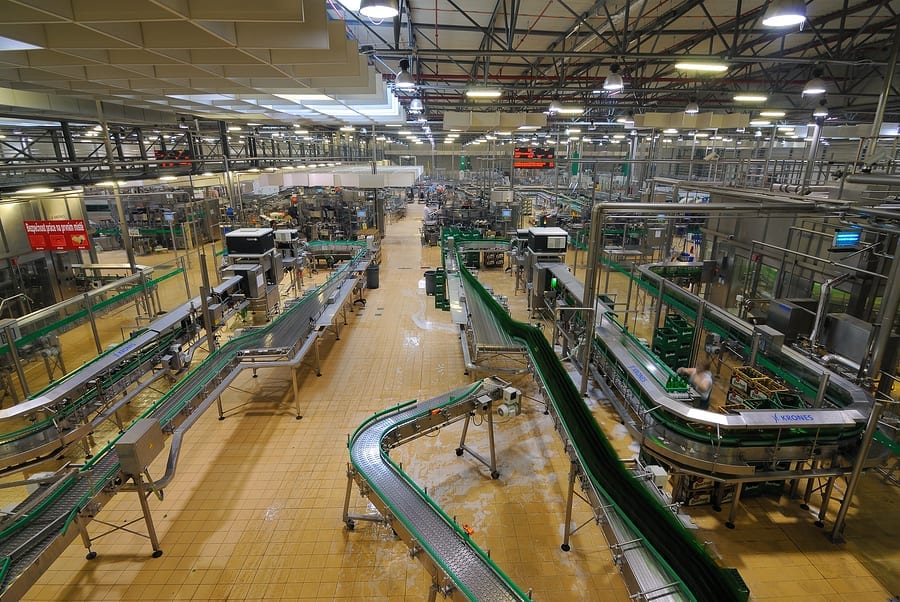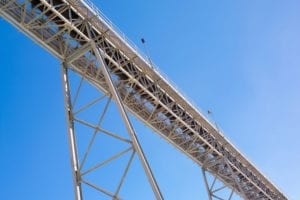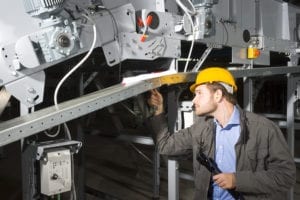Custom Steel Conveyor Manufacturer

Conveyor belts are the cornerstone of modern production lines. A good conveyor belt is a combination of safety, resilience, functionality and acceptability. With these factors varying from one field to another, conveyor belt specifications will always vary as well. Understanding your needs is the key to choosing the right custom metal fabricators and the right specifications for your new conveyor system.
Though regular steel conveyor belts are more common than stainless, stainless is the ultimate choice for conveyors transporting materials that require a clean surface, as is necessary in the food and pharmaceutical industries. This is why stainless steel is perfect for food processing while a regular steel belt is better suited for manufacturing and high-strength applications.
Steel conveyors are versatile. The stainless steel finish makes such belts perfect for pharmaceutical, food, beverage and other delicate manufacturing processes that need a clean sanitized environment. While the material itself might be sufficient in creating the right perfect conveyor belt for the job, you have to think about a couple of factors to get USDA or FDA certifications. These will include:
- Easy cleaning and sanitization
- Stainless surfaces that don’t contaminate food
- Mobile parts that don’t introduce conveyor belt material chips into the product
Apart from this, you will need custom metal fabrications to get the perfect balance between strength, texture and resistance to different chemicals in the product.
Stainless Steel Conveyor Fabricators
While most plant managers understand the importance of choosing the right material for their conveyor belts, choosing the right design is just as significant. No conveyor belt is similar to the other. The top things to consider when designing your new stainless steel conveyor belt include:
- The weight, size and distribution of the product on the conveyor belt
- How the material will load onto the belt (impact loading, for instance, will call for a stronger conveyor belt)
- Any detailed orientation changes as the product travels down the conveyor
- Any traveling on an incline or decline
- Operational environment with regard to humidity and heat
- The need for a modular conveyor belt for flexibility
- Ease of cleaning
Steel Conveyors for Non-Food Products

Even though food and pharmaceutical manufacturers are the most interested in steel-based conveyor belts, other manufacturers also revere the versatility and strength of steel. The steel conveyors will be perfect for high impact loading as it is strong while its ability to resist a wide range of temperatures makes it ideal in dealing with hot or cold production stages.
In addition to this, steel’s natural hardness makes it the perfect surface for metallic or hard products. It is cut and friction resistant meaning that the conveyor belt will give you more work-hours before wearing out.
Structural Components to Consider
Each structural steel fabrication is specific to the product you want to convey. The most common types of conveyor belt are
- Flat surface conveyor belts
- Woven wire belting
- Hinge metal belting
- Conveyor belts with cusps
Flat surface conveyors offer a smooth surface that is both strong and easy to clean. Moreover, the waterproof surface is great for juices or tiny components from food products or other products that could slip through openings in other kinds of conveyor belts.
Woven wire, on the hand, is perfect for flexible applications as it can mold into different shapes easily. You can choose to use rollers at different locations to flip the product and change direction without shortening the conveyor belt’s lifespan. It, however, won’t be a great option of products like steak or tiny products that can dirty or slip through the netting.
Hinge metal belting would be a great compromise between flat surface steel belts and metal belting as they are the best balance between flexibility and the ability to contain small or wet products.
Top Factors That Will Determine the Right Steel Conveyor
Ease of Cleaning
This is the most important factor regardless of whether it is in a food grade conveyor or a general-purpose system. Keeping the production line clean is good for business and production. A simple belt with less moving parts, liquid collection points and self-drain spots will be easier to maintain.
Maintenance
 Maintenance downtime has a great impact on throughput. You will have to design your steel belt with maintenance in mind. The faster and easier it is to maintain and repair the better.
Maintenance downtime has a great impact on throughput. You will have to design your steel belt with maintenance in mind. The faster and easier it is to maintain and repair the better.
Lifespan
Lifespan is directly proportional to return on investment. You will need a great product that will give you high quality service for a long time. This is where steel conveyors have an upper hand against their competitors. A good stainless steel conveyor will withstand corrosive agents regardless of whether the chemicals are from the food or cleaning products.
Configuration Flexibility
A good conveyor belt will adapt to a wide range configurations without having to call in the experts. Conveyors can incline, decline or turn. While most production lines will use one configuration for a long time, some will have to change the configuration at one time in the belt’s lifespan. A belt that is as flexible as it is strong will not only support the product but also have what it takes to conform to a new layout.
Choosing a Custom Metal Fabricator
Working with a custom metal fabricator gives you the flexibility to implement your own design that meets your production specifications. Choosing a great fabricator who designs and builds anything from a turnkey solution that will match your exact specifications to plugins that augment your existing system is the key to implementing the perfect conveyor belt system.
Since the custom steel conveyor production cycle is a complex one, you will need a highly experienced manufacturer with a respectful record of accomplishment. Go through the catalog to see past accomplishments. Talk to the designers about your idea and designs and listen to any suggestions with the sole intent of gauging the producer’s ability to meet your expectations.
Swanton Welding offers you a wide range of custom metal fabrication services complete with design, implementation and post-sale customer support. You can count on our impeccable industrial metal fabrication skills to help you get the perfect custom steel conveyor for your production line.
Project Gallery
Project Gallery
Catalytic Converter
Fabricated stainless steel Catalytic Converter w/ Pipe Bundle. A customer approached us about doing this job out of stainless steel with the stainless pipe bundle being made out of a special seamless tubing. The timeline was critical as the customer had a two day plant outage scheduled and they needed this unit installed during that […]
Project Gallery
Bridge and Boardwalk
Swanton Welding was contracted to build a bridge and boardwalk for a client in Westfield, IN. Our estimation team and project manager worked with the client to make sure we provided an accurate and complete quote and timeline. This project took place from late May through late September of 2024. This bridge and boardwalk, weighing […]
Project Gallery
Stainless Steel Platform
Custom fabricated stainless structural steel platform with carbon steel columns and handrails.
Project Gallery
Steel Stack Fabrication
Swanton Welding & Machining was approached by a client from the clean air industry to fabricate 950,000 lbs. of steel stacks. Eight large stacks were fabricated using a variety of processes including rolling, bending, forming and MIG welding. The stacks were fabricated using a combination of material such as, A36 steel and 304 and 409 […]
Project Gallery
1270 Dredge
Swanton Welding Company began working on this Dredge project in February of 2022 with a wrap-up in October of 2022. This dredge is a medium-sized dredge that offers excellent rates for dredging depths up to fifty feet. This type of dredge is typically used for ports, harbors, rivers, and inland waterway dredging projects, as well […]
Project Gallery
Bottom Casing for Glass Furnace
This custom fabrication project was for approximately 30 Bottom Casings for a Glass Furnace. Each section had to have pads custom machined to ensure it was within 1 mm of flatness. After the individual casings were completed, we had to shop assemble the entire length of them and use a transit to ensure their critical […]
Project Gallery
Mixing Tank Fabrication
A customer from the water treatment industry approached Swanton Welding & Machining to fabricate a mixing tank assembly. The 50,000 lbs. tank assembly was made up of many different parts and systems including rapid mix, reactor and clarifier tanks, a 16′-8″ long platform, and a 15′ high draft tube. To fabricate these components and many […]
Project Gallery
Accumulator Tower for Metal Coating Process
Structural Steel Tower This project consisted of constructing two similar towers. The entry side is pictured and the exit side can be seen in the distance. This new customer to Swanton Welding requested the project to be finish painted before it was delivered. These structural steel towers were assembled in the field and required very […]
Project Gallery
Ship Loader Lifting Truss
Swanton Welding Company recently wrapped up fabrication of a Ship Loader Lifting Truss, a large two-piece assembly designed for a Bruks Siwertell loading system. The finished components will be shipped to Enviva in Wilmington, North Carolina, demonstrating our ability to move oversized fabrications across long distances without issue. The project ran from August 11 to […]
Project Gallery
Truck Dump Project
Swanton Welding fabricated two truck dump platforms. These are used in various industries where semi or other large trucks are driven onto a platform for unloading. After securing the truck, the platform is raised high into the air, and the load on the truck is transferred via gravity into a bin or hopper. Our client builds […]
Project Gallery
CVG Airport Canopy
Fabrication of two large canopies out of steel tubing to be installed at an airport. The canopies were fully assembled in shop prior to shipping. Both canopies were hot dip galvanized to withstand the corrosive installation environment.
Project Gallery
Fulton County Hospital Office Addition
Swanton Welding was tasked with fabricating the steel framework for the new Fulton County Hospital addition in Wauseon, Ohio. We appreciated the opportunity to support Rupp/Rosebrock, Inc. and their construction crews as they constructed a four-story medical building that will attach to Fulton County Hospital. The team at Swanton Welding used our beam line to […]
Project Gallery
Steel Thrustframe Fabrication
A customer from the gas exploration industry approached Swanton Welding & Machining to fabricate an A36 and A-514 steel thrustframe weldment. The 225,000 lbs weldment was fabricated using a variety of processes, including CNC milling, MIG welding, drilling, laser cutting, bending, tapping and forming. The 54′ long and 8′ wide thrustframe was skillfully fabricated using […]
Project Gallery
Glass Furnace Rebuild – Support Steel
A client proposed and drew the initial design of this support steel project. It will encase and support a glass melting furnace for the engineered reinforcements industry. Swanton Welding supplied materials such as tie rods, platform steel, stairs, and ladders for the 20 ft tool glass melting furnace. Fabrication, blasting, and painting were customized to […]
Project Gallery
Purification System Filter
Waste Water Separator This project’s client needed a water tight clarifier tank fabricated. We had to build, weld, leak test, shop assembly, blast, caulk, and paint the tank. In the end, we delivered a completed clarifier tank assembly. Completion Date March 7, 2017 Materials All materials were carbon steel Fabrication Methods This project utilized […]
Project Gallery
Clarifier Tank Project
At Swanton Welding, we have the expertise and resources to meet all your large scale project requirements at our state-of-the-art facility. As your trusted partner in welding and fabrication projects, we are committed to providing exceptional craftsmanship, reliable service, and timely project completion. An example of our capabilities is the recent construction of a sizable […]
Project Gallery
Double Drop Trailer
Swanton Welding Company was contracted to construct a double drop trailer for a client in Ottawa, OH. The project took under two months after a mid-July 2024 start, with completion in early September 2024. A double drop trailer, also known as a lowboy trailer, transports oversized loads considered too large for a standard trailer on […]
Project Gallery
125 Ton Steam Car
We built a 125 Ton Steam Car. We fabricated it, blasted and painted it, did the assembly, electrical work, and shop tested it.
Project Gallery
Ladle Maintenance Carts
Customer needed a way to conveniently transport large ladles to areas where they will be used.
Project Gallery
Support Structure
Swanton Welding is fully equipped to meet all your large-scale structural steel project requirements in-house at our cutting-edge USA facility. We take pride in being a dedicated partner in the success of every fabrication project we complete. Recently, we collaborated with a client based in South Carolina to construct a support structure. Given its critical […]
Project Gallery
Inclined Plate Clarifier
Swanton Welding Company recently completed fabrication of an Inclined Plate Clarifier with an integrated Thickening Tank, a large-scale build designed for industrial wastewater treatment. We delivered the final assembly to Blythewood, South Carolina, where it will be used to remove metals and paint solids from wastewater streams. This project kicked off on December 3rd and […]
Project Gallery
Tire Separator and Hopper
The project involved making a hopper & separator for a tire recycling plant. The hopper was designed to dump truckloads of used tires. It has a motor and sliding floor system that was sloped to feed the tires to the separator, which would separate the tires based on size and feed them to additional equipment […]
Project Gallery
Vertical Clarifiers with Thickeners
These were vertical clarifier tanks used to separate certain materials from water.
Project Gallery
Replacement Boom
It is basically the structural arm for a heavy duty conveyor ship loader.
Project Gallery
CE Boiler Stack Replacement
Swanton Welding was responsible to create a drawing based printed CAD drawings to design and fabricate a replacement stack out of A588 material for the refinery
Project Gallery
Acid Furnace Fabrication
Swanton Welding & Machining was approached by a chemical industry customer to fabricate a 125,000 lbs. acid furnace. We first drafted complete shop fabrication drawings for the furnace using AutoCAD software. We then used a variety of fabrication methods to complete the A516 grade 70 and A-36 grade steel furnace, including: drilling, rolling, laser cutting, […]
Project Gallery
4100 Grillage Fabrication
Barge Stabilizer Swanton Welding took on a project with a simple goal: support a 1500 tons crane with two barges. The heavy duty steel frame binding the two barges together, and the crane would be used to drive in bridge pilings.
Project Gallery
Industrial Conveyor Fabrication
An agricultural industry client approached Swanton Welding & Machining to fabricate twelve, 5,000 lbs conveyor components. Utilizing AutoCAD 2009, we first drafted complete shop fabrication drawings of the component. We then fabricated the 20′ long, 3’6″ high and 8′ wide conveyor section using a CNC beam line, saws, and drills. After fabrication, during which we […]
Project Gallery
Stainless Steel Hopper
We custom fabricated this stainless steel hopper and finished it off with a polished interior for food grade application.
Project Gallery
Project Gallery
Lamella Style Inclined Plate Clarifier
Swanton Welding was contracted to fabricate a Lamella Style Inclined Plate Clarifier that will ship to Mt. Holly, NC, when completed. This fabrication will serve as a wastewater clarifier for the facility in North Carolina. Swanton began this project in June of 2024, and it is currently ongoing. When completed, we expect the fully assembled […]
Project Gallery
Discharge Hopper, Clarifier, Clarifier Structure, Catwalk & Stairs, Auger
We custom built a large Discharge Hopper, a Clarifier used to remove slurry, the Clarifier Structure, accessible Catwalk & Stairs, and a custom Auger for the Clarifier. The most interesting thing about this project was its overall size and the custom auger we built.